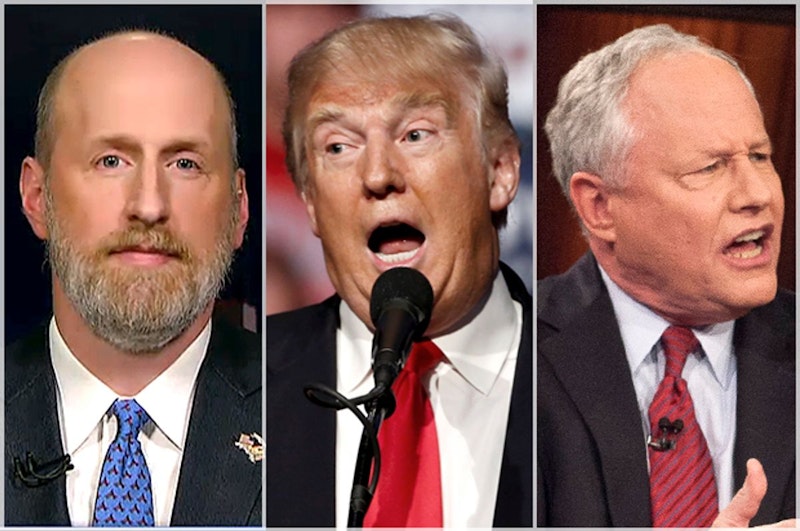Last Sunday I had a spirited political conversation with my 85-year-old mother-in-law—unlike President 31 Flavors, she doesn’t miss a beat—and was a bit surprised, but pleased, that this longtime conservative and two-time Trump voter has turned on the presumptive front-runner (if you believe the daily polls, which is a stretch) and won’t support him again because he’s a “liar and crook, just like most of them.” She lives in California and has plenty to say about that state’s oily Gov. Gavin Newsom (nothing good), but wasn’t ready to line up behind one of Trump’s rivals. Join the club! What struck me was this: although using the internet for commercial reasons, she doesn’t touch social media, yet still had opinions that one associates with online commentators. “The country is broken,” she said, “it’s just a dirty, violent mess.” We went back and forth, convivially, and I pointed out that crime in, say, New York City, was worse in the Koch-Dinkins years than today, and that as she well remembers the late-1960s was also a time when people feared “the end of democracy,” although that phrase wasn’t yet one you heard every single day.
She was wistful about the end-times of conventional newspapers—she still gets home delivery of the Los Angeles Times and reads it daily—chalking it up, understandably, to the unassailable fact that “people don’t read anymore, and when they do it’s just an exercise in validating their own views.” If I had the time, I’d have asked what op-ed columnists she likes and dislikes, but I was hogging the conversation and turned the phone over to my wife so she could catch up with her mom.
Coincidentally, I’d just read a David French column in The New York Times—the putative conservative hired at the beginning of this year to supposedly pair with Ross Douthat and Bret Stephens in the paper’s deceitful show of presenting “opposing views”—and was left with one overriding impression: Why can’t commentators who command a large online audience just tell the truth about what’s on their mind? It’s not a fear of “cancellation,” at least at the Times, where no one who “attracts eyeballs” is ever fired. Perhaps it’s simpler: someone like French has a large social and intellectual circle and I’d guess he craves approval.
French’s May 25 column, “Will DeSantis Destroy Conservatism as We Know It?" was a particularly strange one. He writes: “For conservatives like me who want both to defeat Trump and to begin a restoration of the fusionist policies that once defined the G.O.P., DeSantis presents a dilemma. As I’ve written before, I disagree with DeSantis on many things, but I see Trump as an entirely different order of threat—one who is demonstrably willing to help precipitate mob violence to sustain his hold on power… But whom DeSantis attacks is ultimately less important than how he does it. Republicans, after all, have long fought the left, but DeSantis does it differently, in part by abandoning fusionist commitments to free speech and limited government.” French might’ve added, as a “conservative,” that he’s concerned about the Democrats’ current aversion to free speech, but I’ll let that slide.
French is a Biden supporter, which is fine, but he ought to admit it. I read him on occasion because I’m curious about who the #NeverTrump neocons are hoping will return their side to power. But French doesn’t mention a single Republican he’d prefer to Trump and DeSantis. No Tim Scott, no Mike Pence (a fellow Evangelical), no Chris Christie, no Nikki Haley, no Chris Sununu, no Asa Hutchinson, no Glenn Youngkin, and so on. I wouldn’t support Trump and DeSantis is increasingly crazy with his anti-immigration vitriol and weird embrace of the six-week abortion ban—as if he could ever win a general election endorsing that position—so I’m up a tree. But as a self-proclaimed conservative, you’d think French (and his doing-penance-for-past-transgressions counterpart Max Boot at The Washington Post), given his “platform” would advance or suggest the candidacy of a Republican who meets his criteria. That would interest me, but no dice. Given that, wouldn’t it be honest for French to say that he’s flipped his political allegiance? Perhaps my Splice Today colleague Ken Silber, who’s also embraced the Frum/Kristol/French cabal, can help me out.
Like his Times colleagues, French can’t outright admit he’d prefer Trump as the Republican candidate, figuring (maybe myopic, maybe not) that he’d be the easiest for Biden—again, with the caveat that Biden really does run, which a sane person would say is up for debate—to defeat. In a three-byline story in the Times on May 28, the paper reported that the widening of the GOP primary field is playing into Trump’s hands. From the triumvirate: “The rapidly ballooning field, combined with Mr. Trump’s seemingly unbreakable core of support, represents a grave threat to Mr. DeSantis, impairing his ability to consolidate the non-Trump vote, and could mirror the dynamics that powered Mr. Trump’s takeover of the party in 2016.”
As noted above, I’m no DeSantis cheerleader, but at the beginning of June, 2023 how can any setback be considered “grave”? As the Times knows, many of these candidates will have withdrawn by the Iowa caucuses—such as Vivek Ramaswamy, whose proposal that the voting age be increased to 25, eliminates him, as well as Christie, an attention-hog like Trump, whom he shamelessly sucked up to before the former president’s slights mounted up. Also, the “dynamics” from 2016 don’t remotely resemble those of today.
—Follow Russ Smith on Twitter: @MUGGER2023

